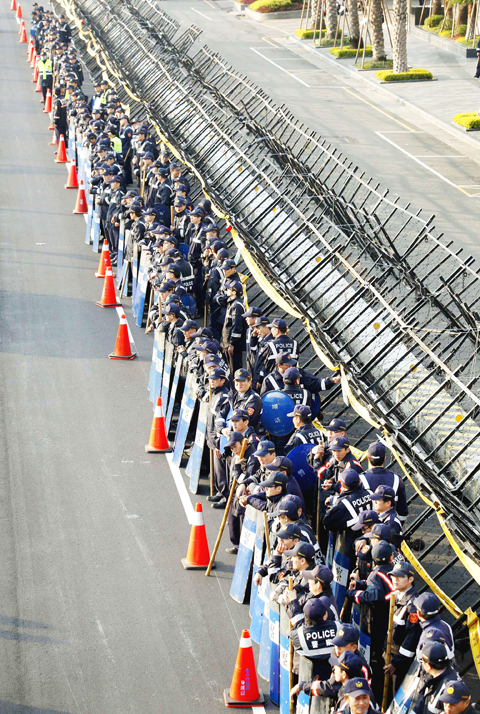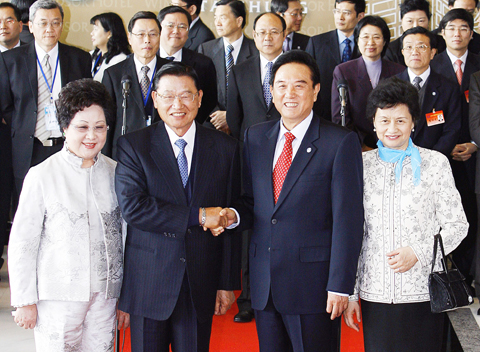China’s top cross-strait negotiator arrived in Taichung yesterday for a five-day meeting with his Taiwanese counterpart amid protests at the airport and his hotel.
Waving to protesters standing outside the cordoned off area surrounding his hotel, Association for Relations Across the Taiwan Strait (ARATS) Chairman Chen Yunlin (陳雲林) told those who welcomed him inside the hotel that he had noted on his way from the airport and outside the hotel that many of his “countrymen” did not welcome him.
‘RESPECT’

PHOTO: REUTERS
Chen said he also saw many who supported his visit and wanted to see the ARATS and the Straits Exchange Foundation (SEF) sit down and talk about and resolve the problems facing both sides of the Taiwan Strait.
“We fully respect the different opinions expressed by our countrymen,” he said.
“For those countrymen who welcome us, I want to say thank you. Thank you, my friends, for your hospitality,” he said.

PHOTO: REUTERS
Chen also thanked the security personnel supervising his visit, whom he referred to as his “brothers and sisters,” as well as Taichung Mayor Jason Hu (胡志強).
WISHING HAPPINESS
Saying that he represented his “fellow countrymen on the mainland,” the ARATS chairman added that he wanted to wish his 23 million “Taiwanese compatriots” happiness and safety.
Chen arrived at Taichung’s Cingcyuangang Airport an hour later than expected.
His entourage exited from one of the main back gates at the airport, avoiding pro-independence activists who had assembled at another gate.
He said he was “greatly excited” that the SEF and the ARATS could do something “practical” for the people on both sides of the Taiwan Strait.
MOVING FORWARD
Over the past year, Chen said the two agencies had signed nine agreements and one consensus, all of which were conducive to the two sides’ economic development and public welfare.
Furthermore, negotiations were conducted on an equal footing and communications were always friendly, he said. The two sides had reached consensus on numerous matters and were moving forward in a practical fashion, he said.
“History has proven and will continue to prove that cross-strait relations are continuing without interruption down the correct path,” he said. “The agreements also show that more people will benefit from them in a more direct way.”
Chen said an increasing number of people — especially “Taiwanese compatriots” — value the mechanism for negotiations between the two sides. The talks have advanced the bilateral economies and well-being of both sides, he said.
‘TEN SUPERHIGHWAYS’
But “there is still a long way to go,” he said. “There may be difficulties ahead, but as long as we keep moving forward, we will see a broader road leading to peace.”
Chen expressed sympathy for the victims of Saturday’s earthquake, which struck off the coast of Hualien County, killing one and injuring 12.
Chiang said the previous nine agreements and one consensus were “10 superhighways” enabling exchanges of people, capital and commodities across the Taiwan Strait.
“Our goal is to pursue peace in the Taiwan Strait and create a win-win situation,” he said.
Looking ahead, Chiang said the new year would be full of opportunities and challenges, but the wisdom and cooperation of the SEF and ARATS could turn challenges into opportunities.
Independence activists and civic groups vowed yesterday to stage more demonstrations against Chen’s visit and the cross-strait policies of President Ma Ying-jeou’s (馬英九) administration.
During the meeting this week, Taiwan and China are expected to sign economic agreements on fishing crew cooperation, agricultural quarantine inspection, industrial product standards, and inspection and certification.
ADDITIONAL REPORTING BY CNA

EUROPEAN TARGETS: The planned Munich center would support TSMC’s European customers to design high-performance, energy-efficient chips, an executive said Taiwan Semiconductor Manufacturing Co (TSMC, 台積電), the world’s largest contract chipmaker, yesterday said that it plans to launch a new research-and-development (R&D) center in Munich, Germany, next quarter to assist customers with chip design. TSMC Europe president Paul de Bot made the announcement during a technology symposium in Amsterdam on Tuesday, the chipmaker said. The new Munich center would be the firm’s first chip designing center in Europe, it said. The chipmaker has set up a major R&D center at its base of operations in Hsinchu and plans to create a new one in the US to provide services for major US customers,

The Ministry of Transportation and Communications yesterday said that it would redesign the written portion of the driver’s license exam to make it more rigorous. “We hope that the exam can assess drivers’ understanding of traffic rules, particularly those who take the driver’s license test for the first time. In the past, drivers only needed to cram a book of test questions to pass the written exam,” Minister of Transportation and Communications Chen Shih-kai (陳世凱) told a news conference at the Taoyuan Motor Vehicle Office. “In the future, they would not be able to pass the test unless they study traffic regulations

‘A SURVIVAL QUESTION’: US officials have been urging the opposition KMT and TPP not to block defense spending, especially the special defense budget, an official said The US plans to ramp up weapons sales to Taiwan to a level exceeding US President Donald Trump’s first term as part of an effort to deter China as it intensifies military pressure on the nation, two US officials said on condition of anonymity. If US arms sales do accelerate, it could ease worries about the extent of Trump’s commitment to Taiwan. It would also add new friction to the tense US-China relationship. The officials said they expect US approvals for weapons sales to Taiwan over the next four years to surpass those in Trump’s first term, with one of them saying

BEIJING’S ‘PAWN’: ‘We, as Chinese, should never forget our roots, history, culture,’ Want Want Holdings general manager Tsai Wang-ting said at a summit in China The Mainland Affairs Council (MAC) yesterday condemned Want Want China Times Media Group (旺旺中時媒體集團) for making comments at the Cross-Strait Chinese Culture Summit that it said have damaged Taiwan’s sovereignty, adding that it would investigate if the group had colluded with China in the matter and contravened cross-strait regulations. The council issued a statement after Want Want Holdings (旺旺集團有限公司) general manager Tsai Wang-ting (蔡旺庭), the third son of the group’s founder, Tsai Eng-meng (蔡衍明), said at the summit last week that the group originated in “Chinese Taiwan,” and has developed and prospered in “the motherland.” “We, as Chinese, should never